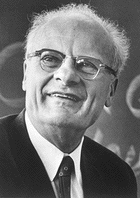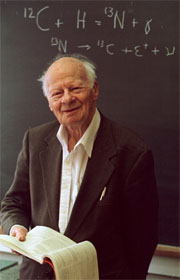 Hans
Bethe Dead at Ninety-Eight. (March 9, 2005)
Hans
Bethe Dead at Ninety-Eight. (March 9, 2005)
|
News & Views item - March 2005 |
![]()
 Hans
Bethe Dead at Ninety-Eight. (March 9, 2005)
Hans
Bethe Dead at Ninety-Eight. (March 9, 2005)
According to his biography in
Nobel Lectures.
Physics 1963-1970 Hans Bethe received the Nobel Prize in
physics "for his contributions to the theory of nuclear reactions, especially his discoveries
concerning the energy production in stars" Born in Strasbourg,
Alsace-Lorraine, on July 2, 1906 after he graduated from gymnasium he
studied at the University of Frankfurt for two years, and then Munich for two
and one half years, taking his PhD in theoretical physics with Arnold Sommerfeld
in July 1928. From 1932-1933,he held a position as Acting Assistant Professor at
the University of Tubingen but lost it with the rise of the Nazi regime. After
spending some time in Great Britain, he immigrated to the United States and in
February 1935 he was appointed Assistant Professor at Cornell University and
then promoted to Professor in 1937. He remained at Cornell with periods of leave
until his death on March 6.
contributions to the theory of nuclear reactions, especially his discoveries
concerning the energy production in stars" Born in Strasbourg,
Alsace-Lorraine, on July 2, 1906 after he graduated from gymnasium he
studied at the University of Frankfurt for two years, and then Munich for two
and one half years, taking his PhD in theoretical physics with Arnold Sommerfeld
in July 1928. From 1932-1933,he held a position as Acting Assistant Professor at
the University of Tubingen but lost it with the rise of the Nazi regime. After
spending some time in Great Britain, he immigrated to the United States and in
February 1935 he was appointed Assistant Professor at Cornell University and
then promoted to Professor in 1937. He remained at Cornell with periods of leave
until his death on March 6.
Bethe's work on nuclear reactions led him to the discovery of the reactions which supply the energy in the stars. The most important nuclear reaction in the brilliant stars is the carbon-nitrogen cycle, while the sun and fainter stars use mostly the proton-proton reaction. Bethe's main achievement in this connection was the exclusion of other possible nuclear reactions. The Nobel Prize was given for this work, as well as his work on nuclear reactions in general.
During the Second World War he worked at Los Alamos where he led the theoretical-physics division. During that period he expressed no particular emotion with regard to his contributions to the success of fabrication of the atomic bomb saying at one point, "I am not a philosopher."
However, later Bethe joined with Albert Einstein and other concerned scientists to educate the public about atomic energy. He went on to campaign to restrict further research on nuclear weapons, while promoting the peaceful use of nuclear energy. He helped to persuade US Presidents Kennedy and Johnson to ban atmospheric nuclear tests and in 1972 Richard Nixon to ban antiballistic missile systems.
Cornell University's 1996 Nobel Laureate in Physics, Robert Richardson says simply, "Hans Bethe was a giant of twentieth century science."
Physicist gadfly Bob Park included this quote from Bethe in his What's New column:
I always wanted to find out how the world is made, what it is made of, what holds it together, what makes it operate the way it does.